Leading the charge: the Dubai start-up greening UAE’s gas guzzlers
Electric vehicles (EVs) are hotly touted as our inevitable future transport solution, though they’ve been around much longer than most people know. The first viable prototype was invented in 1887 by William Morrison, a Scottish chemist living in Iowa, USA, who lashed 24 massive batteries to a horseless carriage and set it running, just to prove it could be done.
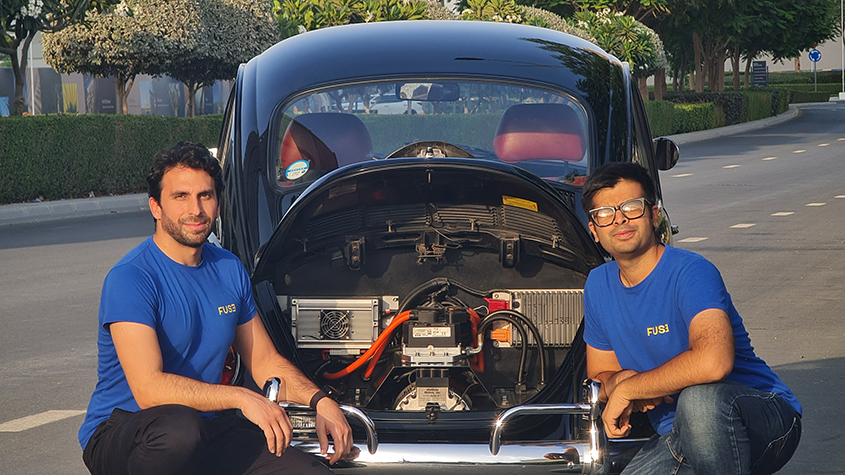
More than 130 years later, as humanity has awakened to the global warming threat and global petroleum stocks have dwindled, the electric vehicle’s moment in the sun has finally arrived.
Between 2012 and 2021, around 17 million EVs were sold worldwide, including fully electric and plug-in hybrids combined, with 145 million electric cars, buses, vans, and trucks predicted to be on the road by2030.
The electric revolution may have started as a gentle trickle, but now the dam has well and truly burst. Worldwide sales of light electric vehicles soared from 0.2% of all sales in 2013 to 13% in 2022, and are predicted to represent more than half (54%) of all vehicle sales by 2040.
Given that burning fossil fuels is known to accelerate global warming, pollute the air we breathe and turbo-charge climate change, the case for electrifying our vehicular future is a compelling one.
Converting classic cars to electric
Upcycling clunky classics into reliable EVs

So far, so sensible. But what are we to do with the millions of combustion engines already in circulation? Should they be mothballed like museum exhibits, consigned to a future as anachronistic curios never to be driven again?
The inescapable fact is that something must be done with them. If they were all written off tomorrow, the resulting scrap mountain would present a further, colossal environmental challenge the planet can do without.
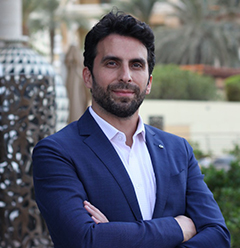
Fortunately, that need never happen, says Salman Hussain, the CEO of UAE-based start-up FUSE, an engineering services company that has been converting cars in electric vehicles in the Gulf state since 2021.
He and his cofounder and CTO Mihai Stumbea started out by targeting the niche classic car market for retrofitting classic ICE vehicles into EVs. They made it their mission to keep vintage vehicles running while lowering their carbon footprint and lightening the maintenance burden.
Fleet electrification
Today, they have turned their attention to greening buses, vans, and trucks, because the market for electric commercial vehicles is notably underdeveloped compared to that of cars.
Salman said: ‘At FUSE we are committed to decarbonizing. We take a petrol engine and the whole power train, and we swap it out for an electric system. We’re also looking for other zero-emission power trains for the future, for heavy trucks and other big vehicles, possibly hydrogen.’
EV charging app
The team carries out the conversions using off-the-shelf components. FUSE takes care of the assembly, but it does not own the hardware.
However, Salman and Mihai have also developed a smartphone app that talks directly to the newly electrified car’s sensors to gather crucial performance data, such as energy consumption metrics and daily use patterns.
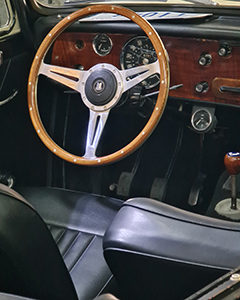
This EV charging app is the lynchpin of the next phase in FUSE’s journey, which Salman calls their Smart Conversion Plan.
‘Picture this,’ he said. ‘You have a fleet of commercial vehicles, such as vans, to be converted, and FUSE provides hardware for the conversion. But we also provide the software to control it and gather data from the system to extend the customer’s endpoint [the distance travelled on a single charge]. If the delivery company is only using the vehicles for short trips and finds they’re unable to do longer trips, we can optimize the system and make it more cost effective.’
In other words, the FUSE app can improve the efficiency of a commercial vehicle fleet and help the owners strategize their logistics to save time and money.
EV charging station locator – small data, big gains
He added: ‘We can also improve our systems and give the owner more data validity, so they can see how the drivers are driving or where they’re most likely to need charging stations. We can then deploy a dedicated set of stations in strategic places or give them a larger battery pack in case they need to make a round trip and stop off at a depot.’
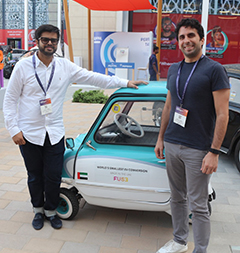
In other words, the app is a feedback-oriented system that FUSE says can deliver value by ‘uptime’ (the percentage of time when charging services are available or in use), which is crucial because EVs are more reliable than petrol cars. The main gripe with EVs is the need to stop and charge them, so FUSE is always looking for ways to reduce downtime as much as possible and keep the owners’ costs down.
Currently, FUSE is doing all the conversions in-house, which means each vehicle that’s brought to them is built out as a one-off. In the future they want to move away from that towards a more dispersed model, where FUSE owns the manufacturing of kits but trains the staff at multiple garages to lead the conversion process following the FUSE program.
The hope is that this will enable the company to scale up its output, lower its costs and function with a more streamlined in-house workforce.
Mobile app patent and copyright
FUSE’s performance app has been developed entirely in-house, which is why the company is currently going through the process of applying for a patent to protect it. Salman and Mihai are also exploring how they can further protect their innovations by copyrighting both the code that powers the app, as well as FUSE’s propriety techniques for converting cars’ internal powertrains.
The United Arab Emirates IP authorities are working to improve its national patenting process by streamlining and making it more user friendly. And in September 2021 the government deposited its instrument of accession to the Madrid Protocol to become the 109th of 125 countries in the Madrid System, and the third Gulf Cooperation Council (GCC) country, alongside Bahrain and Oman, to join the Madrid Union. The Protocol entered into force for the United Arab Emirates on December 28, 2021.
Are electric cars sustainable – a heated debate
The accelerating environmental challenges we face have turbo-charged the urgency to find innovative solutions and technologies across all industries, but especially the automotive sector.
Electric vehicles produce far lower emissions than combustion engine vehicles, both in terms of CO2 and the particulate matter and other pollutants that bring down air quality. EVs are also more efficient than combustion engine cars, meaning they need less energy to travel the same distance, reducing overall emissions and operating costs. Not only that, but they are also quieter, smoother, and are lower maintenance than their hydrocarbon-hungry counterparts.
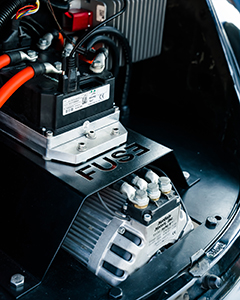
However, debates about the sustainability of new technologies are seldom cut and dried, and this is as true of electric vehicles as it is of other proposed green solutions.
EV devotees are convinced that electrifying transport is directly aligned with the United Nations’ global Sustainable Development Goals (SDGs), especially SDG 7 Clean Energy, SDG 12 Responsible Consumption and Production, and SDG 13 Climate Action for a low carbon future.
Doubters, on the other hand, point out that EV manufacturing still involves a resource-heavy production chain and delivery, issues around battery life cycles and disposal, and that in many countries they are charged using electricity generated by dirty sources, such as coal.
What is clear is that car conversions offered by companies like FUSE go further towards a greener transport landscape because it’s a form of upcycling that keeps ageing cars out of the scrap yard and eliminates the use of diesel and petrol engines. With the benefits of electric power becoming ever clearer, vehicle conversion may yet be the best way to help reduce emissions and fight climate change on the roads.
Source: WIPO

 Client Focus
Client Focus